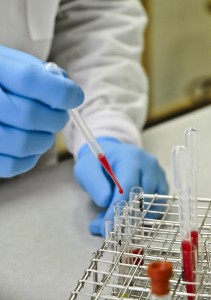Blood draws are becoming more and more common across the board in suspected drunk driving cases. Texas cops are getting in the practice of taking “no refusals”, or getting a warrant to draw your blood if you refuse a breath test. But this massive increase in blood evidence is having a serious effect on the crime labs tasked with testing it. Namely, defendants are having to wait for months to have their day in court.
 According to the American-Statesman, the number of blood samples being sent to the Texas Department of Safety crime labs has climbed 500% in the past six years. Despite this, the number of analysts working the evidence has not increased at all. Naturally, they have more work than they can keep up with.
According to the American-Statesman, the number of blood samples being sent to the Texas Department of Safety crime labs has climbed 500% in the past six years. Despite this, the number of analysts working the evidence has not increased at all. Naturally, they have more work than they can keep up with.
“It’s just real simple,” said chair of the Senate Criminal Justice Committee Sen. John Whitmore. “You’ve got to provide basic state services, and here is a glaring example of our largest police department in the state not having enough resources to do its job.”
Ideally, it only takes a few days to test a blood sample. Generally, before the influx of blood evidence, it would take close to 30 days to get the results back. Though the Department of Safety wouldn’t provide exact numbers, the Statesman estimates that wait time has at least doubled, to 60 days, in recent years.
These delays have far-reaching effects. If a DWI suspect is unable to afford bail or isn’t granted bail, for one reason or another, they could end up sitting in jail as someone who has yet to be proven guilty of any crime—taxing the citizens, the already-crowded jail system, and having untold effects on their life. In addition, witnesses may move away, officers could switch departments, and cases can get buried.
The same analysts who are testing blood samples, test drug samples, so it isn’t only the drunk driving cases that are suffering. Drug evidence is similarly languishing. As a matter of fact, the state has asked prosecutors with misdemeanor drug cases to hold off on sending their evidence; they’ve asked that they send only “what is essential” to the case.
Workers have been shuffled around to try and alleviate the backlog, and the state has increased the number of analysts working on blood tests by 20 percent, not indicating what jobs they were taken from to fill this need.
Officials are asking for 11 new analysts in the next budget.
If you are accused of a DWI offense and have had blood evidence taken, or if you are facing drug charges and are in need of local legal advice, contact us today.







